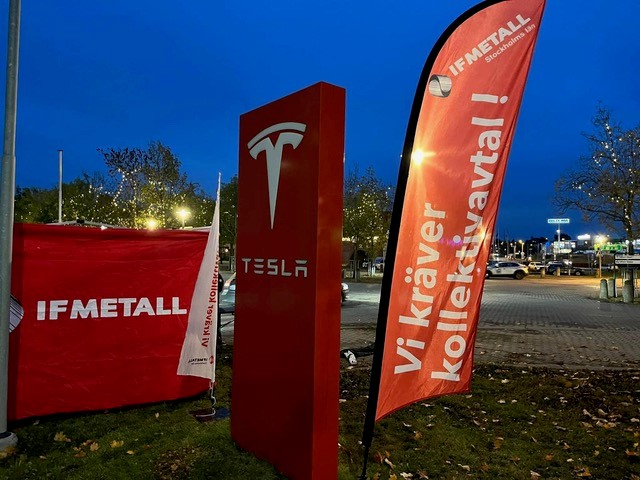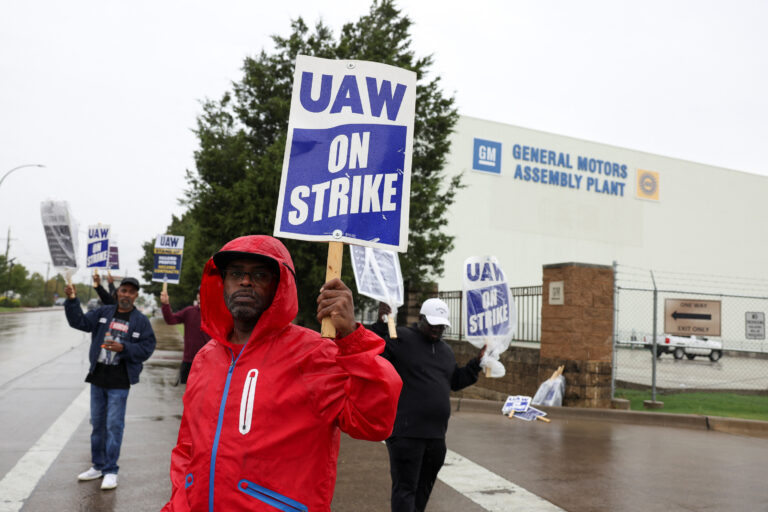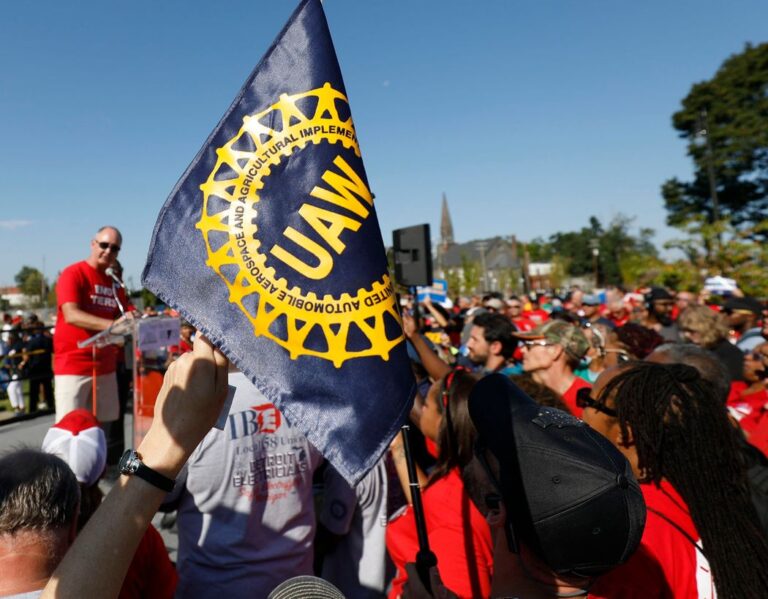
German Bender is a senior research associate at Harvard Law School, an affiliated researcher at the Stockholm School of Economics, and chief analyst at the progressive Swedish think tank Arena
A strike has erupted at Tesla, the notoriously anti-union car manufacturer. Perhaps not surprisingly, the strike takes place in Sweden, one of the most unionized countries in the world. According to the industrial union confederation IndustriALL, it is the first formal labor conflict called against Tesla anywhere in the world.
The strike was called by the industrial labor union IF Metall. The union’s decision follows five years of refusal by Tesla’s Swedish subsidiary, TM Sweden, to negotiate a collective agreement for its employees in repair shops across the country. The first strike notice was limited to union members among Tesla’s own employees, about 120 mechanics and service technicians (there are no Tesla factories in Sweden).
But, after a meeting between TM Sweden and IF Metall, summoned by the National Mediation Office this Tuesday, the company’s representatives withdrew from further negotiations, citing corporate policy not to sign collective agreements in any country.
In response to this, IF Metall immediately expanded its strike notice to all repair shops that service Tesla vehicles in Sweden – not only Tesla’s own shops. An additional 470 workers in 16 cities will be affected in this next phase of the strike, starting on November 3rd.
From that date, no union members in the targeted shops will be allowed to do any work on Tesla vehicles – including service, repairs, or preparing new cars for shipping to the thousands of customers who are waiting for their brand new Teslas (currently Sweden’s top-selling car).
And more can be in store for Elon Musk’s company, unless it heeds union demands. When employers refuse to engage in collective bargaining, Swedish unions can resort to strikes and other forms of industrial action. Some of the options available to unions are bans on new hires or overtime work, and even solidarity strikes by other unions.
An interesting precedent that offers a hint of what Tesla could be up against occurred in 1995 when Toys’R’Us entered the Swedish market and initially refused to sign a collective agreement with the retail union, Handelsanställdas Förbund. The company eventually conceded after three months of labor strife, including a number of solidarity strikes when other unions blocked all deliveries, garbage collection, postal service, bank payments, and other vital parts the firm’s operations. The conflict was even supported by unions in many other countries, who encouraged their members to boycott Toys’R’Us products.
Although the IF Metall strike as yet concerns relatively few workers, it is of principal importance for Swedish labor unions, who see it as a necessary measure to safeguard the country’s heralded labor market model. One of the model’s institutional pillars is for employers to sign collective agreements, usually at the sectoral level, which cover 90 percent of all employees.
Cutting labor costs by refusing to negotiate collective agreements is generally considered unfair competition by unions and employers alike. Unions also see it as a potential risk for downward pressure on wages and working conditions that can harm workers in other companies, and in the long run undermine the model itself.
Another institutional characteristic of the Swedish Model is the fact that workers are not the only organized party – employers are also organized, in employer associations bound by collective agreements. This means that Tesla could also offer their employees the sectoral collective agreement by joining the Swedish Confederation of Transport Enterprises. The employer confederation has informed Tesla of this option, but to no avail. In other words, the pressure on Tesla to adapt to the Swedish Model does not only come from unions, but from the employer side as well.
Another reason why the conflict is of such principal importance for labor unions, is the fact that Tesla is emblematic of the rapidly growing electric vehicle market. Securing collective agreements for jobs created in the industrial transition is one of the most reliable ways to make sure that green jobs will also be good jobs, a vital concern for unions.
But the conflict has symbolic significance for Tesla, too.
The actual costs for a Swedish union contract are negligible, given that it would only affect one or two per thousand of its 120,000 employees worldwide. But it may well be that Elon Musk views the symbolic prize as much higher. A concession to the union in Sweden could bolster union demands in countries where a larger portion of Tesla’s over 120,000 employees work.
In fact, Swedish labor unions are not the only ones pressuring Tesla. Just a few days ago, Bloomberg cited the newly elected president of the powerful German industrial union IG Metall, Christiane Benner, who made a sharp statement directed at Tesla: “You need to be careful. The rules of the game are different here,” she said in reference to the company’s attempts to obstruct union organizing at one of its factories near Berlin, with 12,000 employees.
And in the United States, the United Auto Workers (UAW) ongoing strike at the “Big Three” automakers General Motors, Ford, and Stellantis has lasted for almost six weeks, affecting over 40,000 workers and racking up costs surpassing $9.3 billion, according to Forbes.
While Tesla is not unionized and thus not a target of the strike, its leadership is likely monitoring the developments closely. Some stock analysts and other car makers say that Tesla stands to benefit from the conflict, as they foresee higher labor costs for the Big Three.
Tesla already controls approximately 60 percent of the market for electric vehicles, and according to CNN, the Big Three automakers in Detroit pay their workers 20 to 30 percent more than Tesla’s $55 hourly wage including benefits. If the UAW manages however to negotiate an attractive union contract for its members—Ford and Stellantis have tentatively agreed deals involving wage increases of 25 per cent, which yesterday it was reported General Motors was echoing—it could boost union interest among Tesla workers as well. Clearly, there is interest. Several UAW attempts to organize Tesla workers have failed, partly due to Tesla’s unlawful practices to curb unionization efforts.
Aside from the economic dimensions, there are political considerations. Joe Biden has joined the UAW picket line and it is likely that other politicians will realize that union contracts are a crucial component to ensure decent jobs in the rapidly growing electric vehicle industry.
Seen against the backdrop of union surges in key Tesla markets and in the context of climate policy efforts to promote a just transition, the seemingly small Swedish strike takes on a larger symbolic value.
At the moment, the outcome of IF Metall’s strike is highly uncertain. What is clear is that the union busting methods Tesla has employed in the US will not be tolerated in Sweden. IF Metall would not have taken the risk to challenge Tesla unless it was highly motivated and had carefully considered its options. As noted by Atle Høie, general secretary of IndustriALL, an industrial union confederation representing 50 million workers in 140 countries: “Elon Musk’s business model is to avoid respecting human rights. Now he is taken on by one of our strongest unions. We must defeat the Tesla business model, and Sweden is the best place to start.”









Daily News & Commentary
Start your day with our roundup of the latest labor developments. See all
February 6
The California Supreme Court rules on an arbitration agreement, Trump administration announces new rule on civil service protections, and states modify affirmative action requirements
February 5
Minnesota schools and teachers sue to limit ICE presence near schools; labor leaders call on Newsom to protect workers from AI; UAW and Volkswagen reach a tentative agreement.
February 4
Lawsuit challenges Trump Gold Card; insurance coverage of fertility services; moratorium on layoffs for federal workers extended
February 3
In today’s news and commentary, Bloomberg reports on a drop in unionization, Starbucks challenges an NLRB ruling, and a federal judge blocks DHS termination of protections for Haitian migrants. Volatile economic conditions and a shifting political climate drove new union membership sharply lower in 2025, according to a Bloomberg Law report analyzing trends in labor […]
February 2
Amazon announces layoffs; Trump picks BLS commissioner; DOL authorizes supplemental H-2B visas.
February 1
The moratorium blocking the Trump Administration from implementing Reductions in Force (RIFs) against federal workers expires, and workers throughout the country protest to defund ICE.